Parlez-vous Francais? You won’t need to know it to drive this Citroen though it may help you when perusing the service manual. This French farmer special has called the Pacific Northwest its home for 60 years with the current owner in possession for twenty-four of those 60 years. Since I have never actually encountered a 2CV in the steel, it should be an interesting exercise to take a detailed look. You can find this 1960 Citroen 2CV in Port Townsend, Washington and it is available here on eBay for a current bid of $4,709, twenty-nine bids tendered as of this writing.
The Citroen 2CV was produced between 1948 and 1990, and the first one didn’t look much different than the last. The concept around the 2CV was to offer a very simple economy car that farmers could use to go off-road and drive across their fields and over other obstacles. The 2CV was engineered as an FWD vehicle with a very long rear-wheel travel that allowed it to perform these agrarian gymnastics. At last count, there were about 3.8 MM 2CV’s produced over its 43-year run
The seller has this to say about his Citroen “Mostly just surface rust which is amazing for these cars. The front floor has some rust, see picture., the body is very straight. No accidents.” This car actually shows quite well in what can be best identified as a battleship gray hue. It has a strong finish with a nice shine, straight body panels, and all of its trim intact. The seller states that this 2CV has been garage-stored and it looks it. There is no mileage listed for this Citroen but the closer you look, the better it seems. While there is no word regarding the condition of the rollup canvas “sunroof” but we’ll go with the assumption that it’s in as good a nick as the rest of the exterior.
Under the capuche (hood) is what can be best described as a lawn-tractor motor, a 12 HP, 425 CC (26 CI), air-cooled, flat, two-cylinder engine. As is frequently the case, the old saw, “Car has not been started for 10 years. But ran when I parked it.” comes as admonishment in the listing. To his credit, however, the seller does claim that he will try to get it started this week so there could be an update on the motoring front. Also mentioned is an engine oil leak that sidetracked this 2CV ten years ago. The front-wheel-drive transaxle is a four-speed manually shifted unit.
I’ve been at the beach recently and the beach chairs there look a lot like the seats in this Citroen. They are probably designed to be easily removed and hosed off considering the sorts of plant and animal muck one would encounter on a farm. It’s doubtful that they would be comfortable for a long jaunt but then this unusual little car’s top speed is only 49 MPH so a family vacation is probably out of the question. That said, what comprises the spartan interior of this 2CV appears as original and is in the expected condition.
If you want to see some more in-depth detail on the inner workings of a Citroen 2CV, here is an episode from the reality TV show FantomWorks where the team takes on the restoration of a 1962 example. Any way you cut it, this is a goofy looking car but it had its purpose and it obviously sold very well. It’s a definite curiosity item and it would be a lot of fun if you had some serious acreage and wanted to survey your north 40. And the bid amount, at this point, is surprising as there are twenty-nine bids of interest. Assuming that you were inclined towards this Citroen, how would you use it?
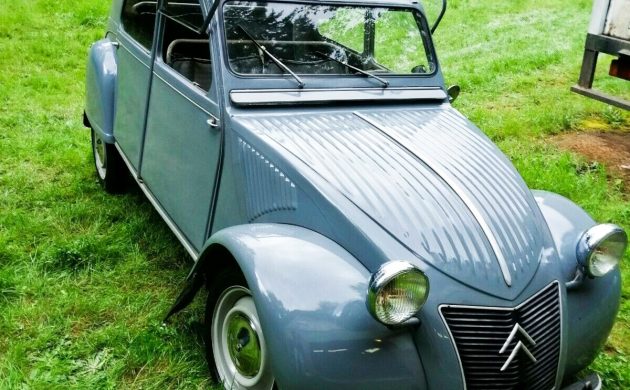
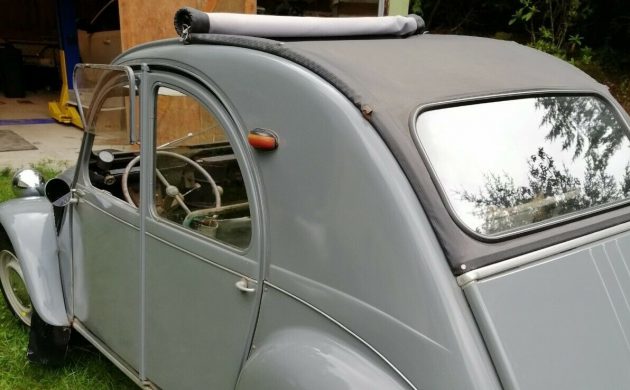
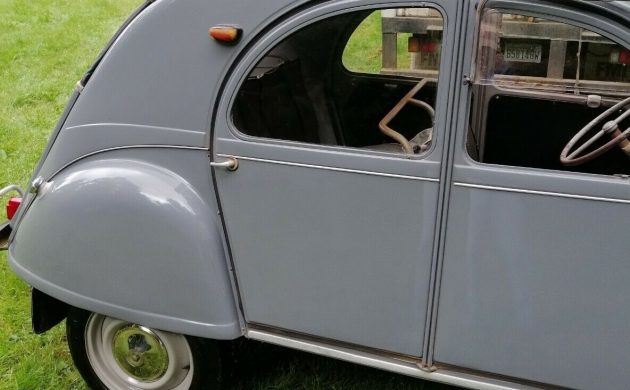
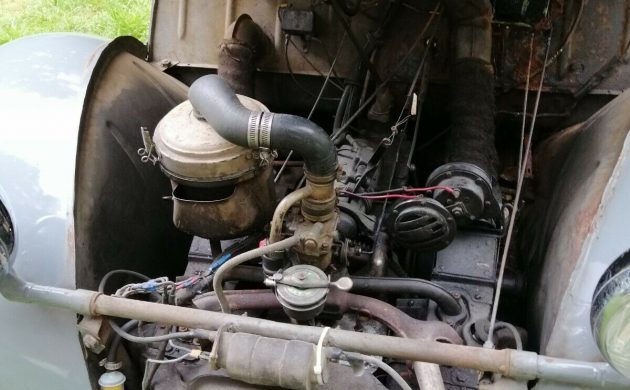
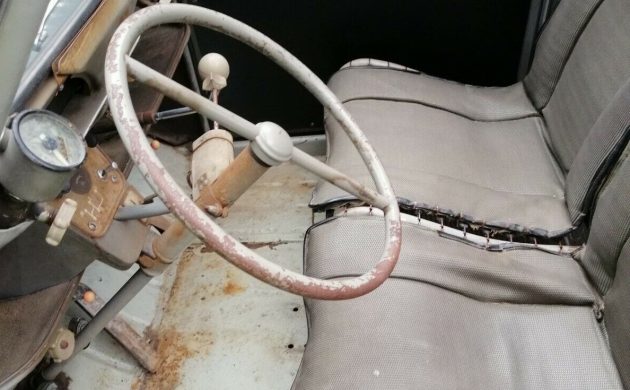
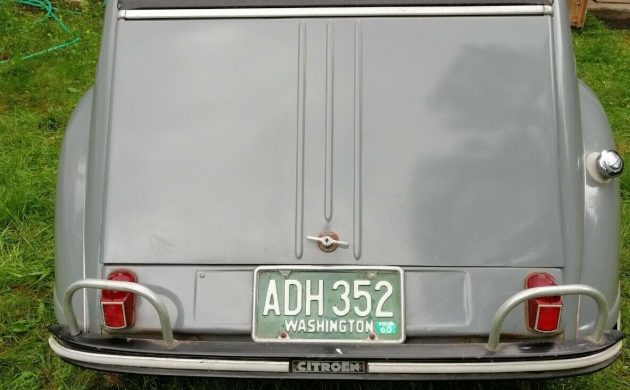




Hello Jim,
In french the soft top of a car is a capote. A capuche is a hood of a piece of clothing.
Oops, thx Bernard, my last French class was in ’72 so I’m a bit rusty.
JO
I knew a French girl once up in Quebec named Christine. She used to talk a lot about these cars. Never a fan of them, but I let her ramble on because I was a BIG fan of her.
I was just in Paris last year, and even as little as ten years ago, these things were everywhere but now they are mostly novelty taxis that carry tourists around the city.
“I feel like a midwife…”
There is a special level of hell wherein car guys have to go to the cruise in pushing a light yellow 2CV.
Reminds me of how much better the Lomax and other 2CV based kit cars looked before they were converted.
https://barnfinds.com/quirky-3-wheeler-lomax-lambda-3/
https://barnfinds.com/le-unusual-le-patron-citroen-based-sports-car/
I’ve had a few 2CV and they are great cars, but I do actually prefer the later ones because the 602cc 29 hp “big block” engine makes such a big difference in driveability.
This one does indeed look quite complete, original and even the VIN number is indicating the correct year and model (something that is rather rare for 2CV)
The rust in the front floor is a concern, it is very common but it may also indicate issues with the frame. And perhaps it is only how the car is parked for the pictures, but the clearest indication of a rusty frame is when the suspension looks low at the front as the front wheels bend in under the fenders. The pictures look a tad suspicious, I think I’d like to see a picture of the whole car in profile on flat ground, and also close up pictures of the front parts of the frame.
As a PS it seems like the seller is into these cars as he also has an AK body in the background.
These early models used the speedometer cable to run the windshield wipers, although there was an electric option, which may have only been for cars sold in Canada. No gas gauge either. Long leather dipstick. A friend of mine had an old one like this, and I had the 602cc engine “3CV.” There is a huge difference in power.
These are the ugliest cars ever made. There is no excuse for making something so ugly and out of proportion, they look like hat boxes on wheels.
Function does not always have to follow Form. The French look at a problem and design a car to get around the problem. This little car was designed for French Farmers. They bought millions of them, therefore being a lot more successful than many a car where Function followed Form. They are far from the ugliest car ever made. As examples of ugly cars I point you towards just about anything produced by the Russians and Eastern European in the Cold War years. The 2CV was never designed to be beautiful. It was designed to be functional. Much like Landrovers and Jeep and VW.
Oh please, there are far more deserving candidates for the accolade ‘ugliest cars ever made’!
For a 1960 duck (that’s what they are called in Germany), the car is in superb conditions! As students in the 70s & 80s, lots of my colleagues had those (later models though). Easy to work on, brilliant simple engineering solutions (like the windshield wipers in the early model being driven by the speedometer cable, the faster you go, the faster do they wipe …).
The whole döshewo culture is one of a kind, if you ever have time to go to a world-2CV-Meeting (Weltententreffen) you’ll meet incredible people with incredible cars.
If you get seasick easily, this car is not for you … inclination in curves tends to be often unexpected for newcomers.
I read somewhere long ago that when you encounter a 2CV in the wild with someone who has never seen one, you walk up to it, grip it by the roof rail, and give it a violent shake, to show just how pliant the suspension is. It always seemed rude to the little car to assault it that way, but I admit that I did that with my wife when we saw one in northern Illinois one afternoon.
PS: here’s a linkt a good movie from the last world duck meeting:
https://www.2cv.hr/en/
Great video. Haven’t been to a world 2CV gathering but I hear they are like no other. I am currently restoring a ‘56.
Humorous British advertisements from the eighties plus simple direct adverts for the “Remarkable” 2CV Citroen from early days praising the car for “Reliability and Economy”.
Truly funny comparison of a 2CV and a camel, its closest rival. There’s more:
https://www.citroenet.org.uk/publicity-brochures/gb/gb-2cv.html
Moi je parle bien Français, je le suis.
La 2 cv est une des voitures mythiques Française. Pour un modèle d’avant 1960 avec les portes suicides c’est à dire à l’envers et dans un état correct comme celui-ci, la côte est de 6000 euros. Restaurées or, elles atteignent 20 à 25 000 euros.
L’intérêt de cette voiture est qu’elle est très facile d’entretien et de restauration. La caisse étant démontable du châssis, il faut 3 heures pour la démonter entièrement et en deux jours on remplace le châssis et les planchers.
Bref le rêve de la restauration automobile.
..these cars are amazing..and fetching ever increasing amounts of money in Europe. Agree the earlier cars like this are slow but will go on for ever with minimum attention. Developed for farmers use (high so they could keep a hat on-honestly !) the seats indeed clip out for easy wash-and for family picnics
Once got a hitch hike ride in later 602 one in the south of France. Turned into a bit of a race with a Renault 16 ..the Citroen won….and there again there’s the yellow one in the Bond film too
This is cheap-and parts including chassis easy to source
I had a ‘68 a long time ago. The seats click into a series of holes in the floor. I once accelerated (if you could call it that) away from a stop light and the rusty hole in the floor gave way and both the seat and I wound up in the back seat of the car. No harm done, but it’s something I’ll never forget – and most people in that line of traffic won’t either.
Oh yes, and one morning I was driving to work and was stopped by the police. The cop just wanted to know what it was I was driving!
These Citroen 2 CV bring back good memories when I used to live, studied and worked in Paris! I had one these and truly loved it along with my French wife! They ride amazingly smooth on those cobble stone Parisian roads, they were also cheap and easy to repair. Mine was a 1969 model which had a hand crank! Too bad I had to sell it when we moved back to America…I missed that old (second) French gal!
In 1966, a friend and I leased one for a 3 month ramble around Europe. Ours had traditional, very comfortable, seats. We averaged 50 mpg. Definitely not speedy, but very reliable.
What a surprise: No statement as to documented low mileage!! Would that this was more common.